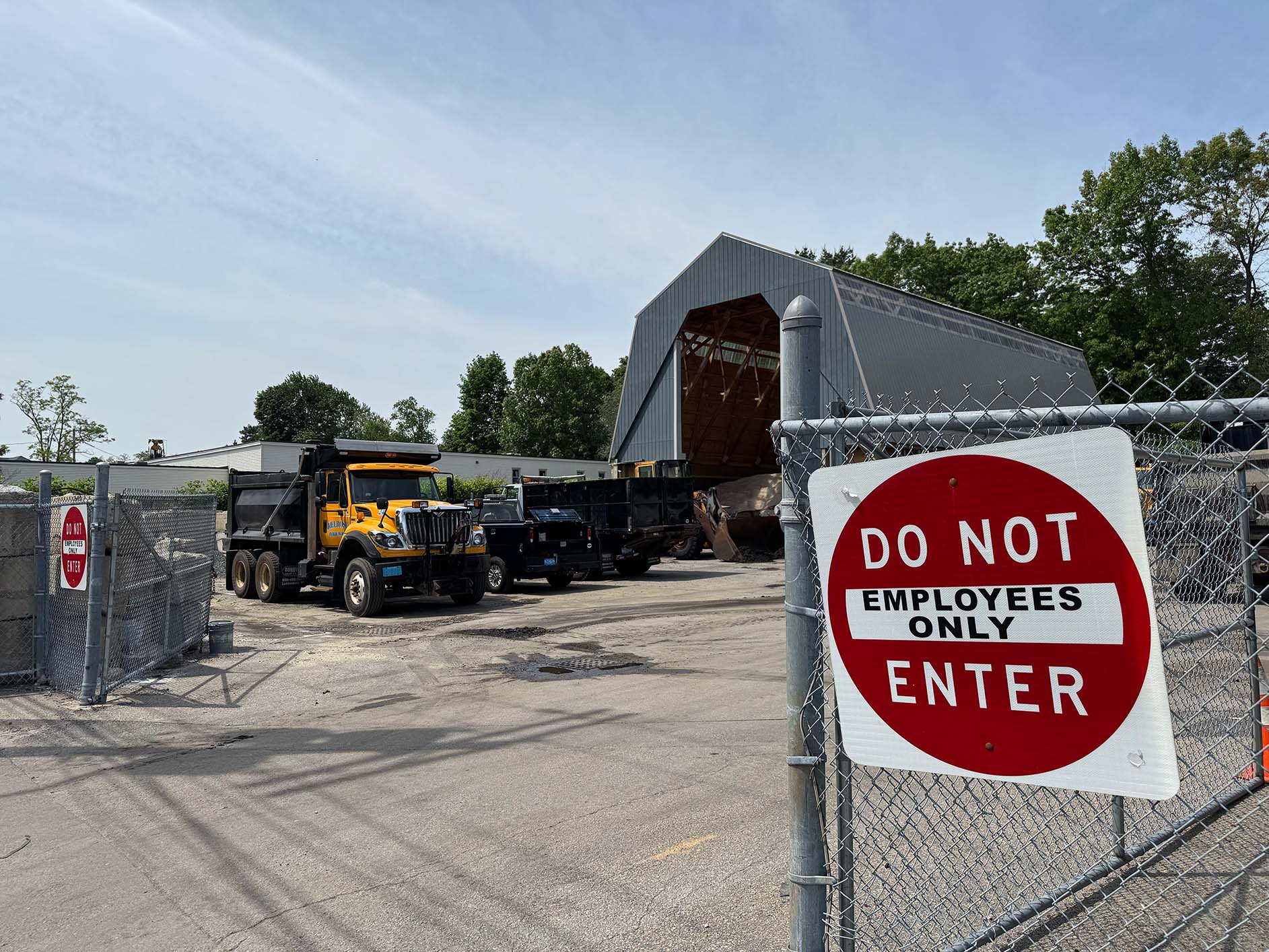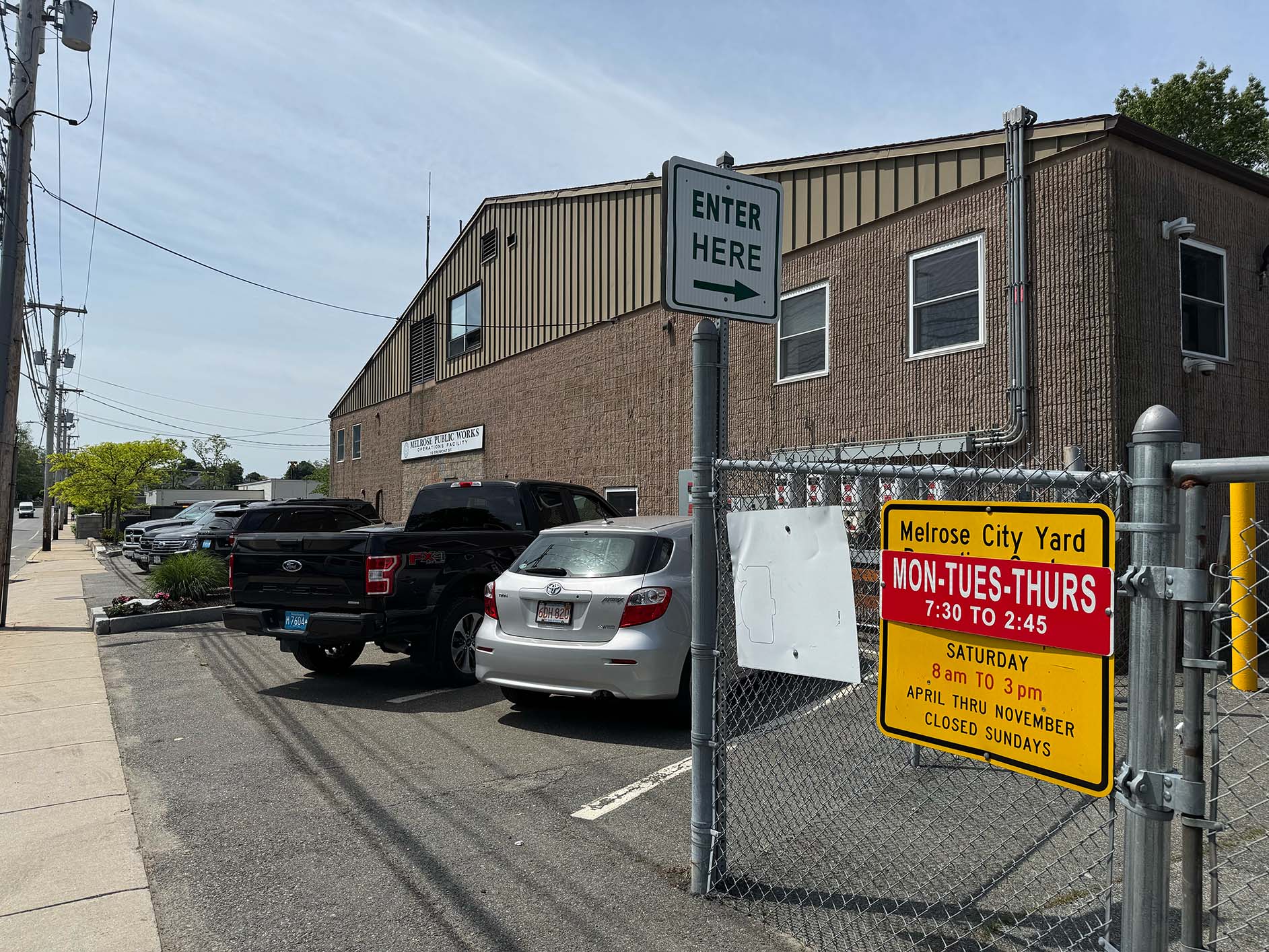Public Works To See Cuts in Next Year’s Budget
By Ellen Putnam

DPW facility on Tremont Street
Last week, the Appropriations and Oversight Committee of the City Council heard from the Department of Public Works (DPW) about its budget for Fiscal Year 2026 (FY26), which begins in July, including planned service cuts within the department.
The DPW, which makes up 8.4% of the city’s overall budget, serves a number of functions: custodial and maintenance work for all municipal buildings, including the schools; administering contracts and billing for trash, recycling, water, and sewer; maintaining the city’s roads, parks and the Wyoming Cemetery; maintaining most of the city’s fleet of vehicles; and administering capital projects.
Due to rising costs in a number of areas that are outpacing revenue growth, the City of Melrose has a budget gap of $6.1 million to carry this year’s services into FY26. To fill that gap, the city is making $4 million of cuts to the school budget, and $2.6 million in the rest of the city budget.
The DPW’s budget, at $8.7 million in FY26, will see the largest total cuts of any city department: $414,000, or 4.5% of the department’s budget.
These cuts will be made by leaving six vacant positions unfilled, including the City Engineer and Facilities Manager positions, which are top-level roles. Reductions will also be made to the DPW’s overtime budget. And the part-time summer work program, which employs high-school students to help with projects across the city, has been moved off of the budget and onto free cash. (Last month, the City Council appropriated $120,000 in free cash for this summer's work program.)

DPW workers installing crosswalk beacons on Main Street
Photo Credit: Nancy Clover
The unfilled positions at the DPW will have a number of impacts on city services.
One of the City Engineer’s roles is securing and administering state and federal grants for the city. These have typically brought in between a million and several million dollars in funding each year. Some of these grants have funded stormwater, climate resilience, and roadway projects.
With the City Engineer position unfilled, explained DPW Director Elena Proakis Ellis, “we’re going to have to work with one fewer body in the engineering division, and they are all needed to just get the regular day-to-day work done. So we’re basically putting a halt on all new programs. We will not be applying for new grants.”
“On the Facilities Manager end,” Ellis went on, “there’s a ton of deferred maintenance. Our Facilities Manager was out in the schools and public buildings all the time, trying to foresee problems. Trying to prevent things from happening. One risk is that we have to be more reactive now. We have to wait for something to fail before we can necessarily get to it.”
One vacancy will also go unfilled in the Cemetery division. “I like to think of Cemetery, Parks, and Forestry as all a group that does similar work,” Ellis explained, “And so everybody’s cross-trained, and we put everybody where they need to be the most. And I would say that Cemetery - when there’s a funeral, that’s a must have. We have to do the preparations for that. And so someone typically is getting pulled from Parks and Forestry into Cemetery to keep up with that demand. And so it ends up being Parks and Forestry that fall behind.”
“Right now we are very behind on tree trims and tree removals,” she went on, “and most likely we’ll continue to get behind on those. And if we don’t keep up on removals - if we have a tree we’ve identified as a dead tree and then we don’t have time to take it out - then that’s a liability.”
“And we're doing our best to keep up on our mowing and maintenance,” Ellis added, “but we have only a handful of employees, and we have over 80 locations that we maintain weekly to twice a week. So the grass might be a little longer. It might take a little longer for us to get out and line a field or have things ready for a user group.”
One of the three positions in the DPW’s automotive division, which maintains the DPW’s fleet as well as the city’s police cruisers, will also remain vacant. This is likely to mean that either vehicle maintenance will be delayed, or that some repairs may need to be outsourced at a higher cost to the city.

One of the parklets in 2023
Photo Credit: Nancy Clover
Reducing the DPW’s overtime budget will have several effects. Some may be less noticeable to residents, such as consolidating some solid waste and recycling events to cut down on administrative overtime. Other reductions may be more inconvenient to residents, such as reducing Saturday hours for recycling and yard waste dropoff at the City Yard.
“We do a lot of items on overtime that we can’t do when there are cars parked on the street or when there’s too much traffic,” Ellis explained. This includes watering the Main Street flower baskets, which will not be put out this year, and installing parklets. The DPW may still install outdoor dining for restaurants and hang banners over Main Street, but they will charge businesses and organizations a fee for the service.
The DPW will also be ending Sunday trash pickups from public spaces and parks, and will be piloting carry in-carry out at Foss Park, Hesseltine, the Common, and Cedar Park. “We know a lot of other communities successfully do carry in-carry out at their parks,” said Ellis, “but we don’t want to say definitively that we think it’s going to work. So we’re going to try it out at these locations. But if we have to go back to having trash pickup there, it will stretch our resources even thinner.”
“As we go through this challenging year,” added Assistant Director Jim Troup, “we’re asking people for help. And carrying your trash with you is a very easy thing for people to help out with.”
Some maintenance tasks, such as repainting crosswalks and traffic lines and maintaining street signs, will also be decreased. “If a stop sign comes down,” said Ellis, “obviously we’ll put that right back up. If a parking sign is faded, we may not be replacing it.”
The DPW will also reduce its spending on drain maintenance and drainage projects, which are regulated by the National Pollutant Discharge Elimination System. “We’ll still meet the federal permit,” Ellis noted, “but we’ll just do the exact minimum of what we need to do.”

DPW City Yard on Tremont Street
Some spending on sidewalk repairs has also been moved off the budget and onto free cash. While there is still a line item in the budget for fixing sidewalk safety issues, said Ellis, “we may have to be a little more discerning on what we consider to be an immediate safety concern.”
Melrose has typically underspent on road maintenance, and this year’s budget will not fix that. “We have estimated that we need about $2.6 million per year to keep up long term on roadway conditions,” said Ellis, “and we tend to spend between a million and a million and a half per year.” She noted that road work, outside of immediate repairs like fixing potholes, is not typically included in the city budget, and instead comes from state Chapter 90 funds, road bonds, and contributions from private utilities who do work in the city, such as National Grid.
The city has also typically invested in vehicles only when absolutely necessary, which may become a problem at some point. “We had a consultant tell us we should be spending approximately a million dollars a year to keep our fleet at its current level, or to move toward having everything within what they consider to be industry-standard ages,” said Ellis, “and we have not allocated any money, other than a couple of emergency allocations to vehicles, in the last two to three years. So with deferred maintenance, we’re heading in the wrong direction.”
One area that is seeing a 2.5% increase is the snow and ice removal budget, in an effort to align that budget with what the DPW typically spends on snow and ice removal. Each winter, the DPW spends what is needed on snow and ice removal, and then makes a free cash request to the City Council in the spring if they spend more than was budgeted. (This spring, this free cash request was for $250,000 in additional funds, above $725,000 that had been budgeted.) This year's increase in spending for snow and ice is not expected to impact services next winter.

Follow Us: